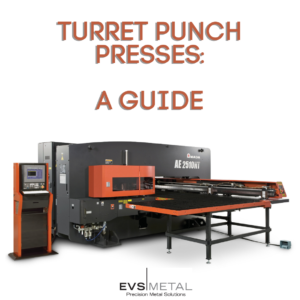Article Revised August 26th, 2022

In 2019, EVS Metal acquired a state-of-the-art Amada servo-electric turret punch press for their New Hampshire facility, making it the third EVS location with this type of advanced metal fabrication technology. What makes this punch press so much more advanced than machines of the past that EVS would want to invest hundreds of thousands of dollars in such an upgrade?
A large part of the decision to make this upgrade, costing hundreds of thousands of dollars, has to do with the type of power this new machine uses to operate. The three main power sources for turret punch presses are mechanical, hydraulic, and servo-electric, and our new punch press uses servo-electric power, the most efficient of the sources. Today, we’ll look at each type to demonstrate why servo-electric-powered machines are the best of the bunch.
Mechanical Power
Mechanical punch presses are the least common type in use at the moment. Mechanical power utilizes a clutch and brake system that triggers a flywheel, which in turn activates a Pitman arm, the oldest type of turret punch press technology still in use today.
Mechanical machines can offer precision, as well as labor and energy savings. They are also fairly small and take up relatively little of the limited space on a shop floor. However, they are generally not as cost-effective as other types of punches and aren’t as efficient as newer servo-electric-powered options.
Hydraulic Power
Hydraulic-powered turret punch presses are quite different from those running on mechanical power. There are no motors turning a flywheel or clutches actuating a Pitman arm. Instead, it simply uses a hydraulic cylinder to do the punching, which is supported by various equipment so that the punching action is very precise. However, hydraulic presses can be large, depending on the one chosen. This is one reason why servo-electric presses, even though they are considerably more expensive than hydraulic, are considered an excellent investment for those who can afford to add them to their stable of machines. For even the largest metal fabricators, floor space will always come at a premium and is considered valuable real estate for the company.
Hydraulic machines are accurate and get the job done. They are the most common type of punch press currently in use. However, they are not considered efficient, especially when compared with servo-electric-powered machines. In addition, there are challenges with repeatability due to the heating and cooling of the hydraulic fluid (a chiller must be used to keep the temperature consistent, which makes it expensive to power), as well as reliability. They also require frequent oil changes to keep the hydraulics in working order, which can be an expensive maintenance issue.
Looking for precision sheet metal fabrication and machining services?
Servo-Electric Power
Our new Amada 2510NT turret punch press uses a single AC servo-drive to power the Pitman arm that drives the machine’s punch-pressing operation rather than pneumatic or hydraulic power. The machine’s electric motor is equipped with an encoder that allows it to turn precisely based on a set “program,” making it more efficient to run as it’s only using power when it is firing the Pitman arm to move the ram and actuate the punching action.
Because it uses less energy, it is less expensive to operate. In fact, it consumes only 4.5kW of power at its highest run rates; this is about 3 to 4 times less than a typical hydraulic machine. Even its standby power consumption is low — the lowest of all similar Amada machines. While more energy-efficient, these presses still offer the processing speed of hydraulic-powered machines. And because they aren’t powered by pneumatic or hydraulic power — two comparably complex systems — servo-electric presses require less maintenance while still being incredibly reliable.
About EVS Metal
EVS Metal is an American precision metal fabricator headquartered in Riverdale, NJ. Our machinists and operators utilize the latest technology to cut, bend and finish stand-alone items as well as parts for integration or assembly into more complex products. EVS Metal’s four ISO 9001:2015-certified locations comprise over 250,000 square feet of vertically integrated manufacturing space and feature the most modern equipment available, from lasers and CNC machining centers to automated powder coating lines.
We serve a diverse customer base across North America, providing a range of services from quick-turn prototypes to high-volume production runs. Request a personalized metal fabrication quote online or call (973) 839-4432 to speak with a specialist today.





